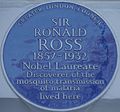Ronald Ross
Sir Ronald Ross (13 May 1857 – 16 September 1932) was a British medical doctor who received the Nobel Prize for Physiology or Medicine in 1902 for his work on the transmission of malaria, becoming the first British Nobel laureate, and the first born outside of Europe. His discovery of the malarial parasite in the gastrointestinal tract of the Anopheles mosquito in 1897 proved that malaria was transmitted by mosquitoes, and laid the foundation for combating the disease. Ross is considered one of the greatest figures in the history of malaria research.
Early Life and Education[edit | edit source]
Ronald Ross was born in Almora, India, then part of the British Empire, to Sir Campbell A. Ross, a General in the British Indian Army, and Matilda Charlotte Elderton. He was sent to England for his education, attending St Bartholomew's Hospital Medical College after spending some years at King's College London. Despite initially studying engineering and mathematics, Ross eventually turned to medicine and completed his medical studies in 1881.
Career and Research[edit | edit source]
After qualifying as a doctor, Ross joined the Indian Medical Service in 1881 and was posted in various parts of India. His interest in malaria began while he was stationed in Bangalore in 1894. He started his research into the disease, focusing on the hypothesis proposed by Alphonse Laveran, a French army doctor who had discovered the malarial parasite in human blood in 1880, and the theory that mosquitoes could be the vector of malaria proposed by Sir Patrick Manson, a British physician. Ross conducted his most notable work in Secunderabad, where, on 20 August 1897, he made the groundbreaking discovery of the malarial parasite inside the stomach of an Anopheles mosquito. This finding confirmed that mosquitoes were the vector for malaria. Ross continued his research, further elucidating the life cycle of the parasite, including its development in mosquitoes. He also worked on prevention strategies, including mosquito control measures.
Later Life and Honors[edit | edit source]
After returning to Britain in 1899, Ross worked at the Liverpool School of Tropical Medicine and later held a chair in Tropical Medicine at the University of Liverpool. He was knighted in 1911 for his contributions to medical science. Ross's work had a profound impact on public health. His discoveries led to the development of strategies for the control and eradication of malaria, which have saved millions of lives. He also wrote extensively on public health, literature, and mathematics.
Death and Legacy[edit | edit source]
Ronald Ross died in London on 16 September 1932. His legacy lives on through the continued efforts to combat malaria around the world. The Ross Institute and Hospital for Tropical Diseases was established in his honor, and his work is commemorated every year on World Mosquito Day, observed on 20 August, the anniversary of his discovery.
Selected Works[edit | edit source]
- The Prevention of Malaria (1910)
- The Memoirs of Sir Ronald Ross (1923)
See Also[edit | edit source]
Search WikiMD
Ad.Tired of being Overweight? Try W8MD's physician weight loss program.
Semaglutide (Ozempic / Wegovy and Tirzepatide (Mounjaro / Zepbound) available.
Advertise on WikiMD
|
WikiMD's Wellness Encyclopedia |
| Let Food Be Thy Medicine Medicine Thy Food - Hippocrates |
Translate this page: - East Asian
中文,
日本,
한국어,
South Asian
हिन्दी,
தமிழ்,
తెలుగు,
Urdu,
ಕನ್ನಡ,
Southeast Asian
Indonesian,
Vietnamese,
Thai,
မြန်မာဘာသာ,
বাংলা
European
español,
Deutsch,
français,
Greek,
português do Brasil,
polski,
română,
русский,
Nederlands,
norsk,
svenska,
suomi,
Italian
Middle Eastern & African
عربى,
Turkish,
Persian,
Hebrew,
Afrikaans,
isiZulu,
Kiswahili,
Other
Bulgarian,
Hungarian,
Czech,
Swedish,
മലയാളം,
मराठी,
ਪੰਜਾਬੀ,
ગુજરાતી,
Portuguese,
Ukrainian
Medical Disclaimer: WikiMD is not a substitute for professional medical advice. The information on WikiMD is provided as an information resource only, may be incorrect, outdated or misleading, and is not to be used or relied on for any diagnostic or treatment purposes. Please consult your health care provider before making any healthcare decisions or for guidance about a specific medical condition. WikiMD expressly disclaims responsibility, and shall have no liability, for any damages, loss, injury, or liability whatsoever suffered as a result of your reliance on the information contained in this site. By visiting this site you agree to the foregoing terms and conditions, which may from time to time be changed or supplemented by WikiMD. If you do not agree to the foregoing terms and conditions, you should not enter or use this site. See full disclaimer.
Credits:Most images are courtesy of Wikimedia commons, and templates, categories Wikipedia, licensed under CC BY SA or similar.
Contributors: Prab R. Tumpati, MD













